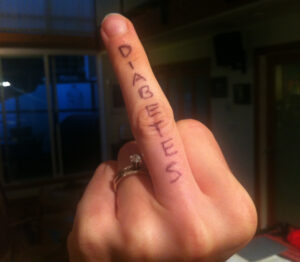Did you know that diabetes is associated with increased mental health disorders? And yet, in Canada, many of our diabetes and endocrinology clinics do not have counselling services attached. Why is counselling in T1D care NOT more valued?
This post explores:
- The very real mental health condition of diabetes distress and burnout, and the struggles that people with T1D navigate with diabetes distress
- And why I, as a healthcare professional and person with T1D, want to see counselling added to our diabetes clinics
Diabetes mental health – the stats
The American Diabetes Association defines diabetes distress as emotional distress that results from living with diabetes, and the burden of relentless daily self management. It includes feelings of stress, guilt, denial – all related to diabetes.
We have clear research that shows:
- 30% of young adults with type-1 diabetes have diabetes distress. (Friends, that does not go away with age)
- One in four people with T1D have high levels of diabetes distress
- People with type-1 have a 3-5 times higher risk for developing depression than people without
- More than 15% of children and teens with type-1 have anxiety. (Again, that likely does not go away with age)
- 45% of mental health conditions go undetected in people with diabetes
Many in the T1D world also struggle with disordered eating and diabulimia, both of which are very much areas of diabetes-related mental health risk.
W’oh – to all of the above!

Diabetes distress to diabetes burnout
Why are we at such heightened risk for mental health conditions with diabetes?
So.
Many.
Reasons.
On average, we make 180 decisions a day related to our diabetes management. That’s just for diabetes care, nothing else. That is a lot of things that we’re having to think about related to diabetes, on top of all the other day-to-day, non-diabetes decisions we need to make.
Diabetes distress affects at least 30% of the diabetes population, which, in Canada, is close to six million people (includes both T1D and T2D). Do the math; that’s a lot.
There is also a social burden, for many of us, that comes from living with diabetes. This burden is rooted in judgement and stigma – around our blood sugar numbers, A1c results, foods we eat, activities we do or don’t do. All of this can heighten the distress of this condition.
I’ll be frank, some days I really don’t want to do diabetes. I’m tired, exhausted even, and I don’t want to think about it. I don’t want others to think about it on my behalf. I just don’t want to do it.
And that is more than diabetes distress; that is diabetes burnout.

Diabetes burnout is a state of physical or emotional exhaustion caused by the continuous distress of diabetes and the efforts to self manage diabetes. It can feel like:
- Overwhelming disappointment related to diabetes
- Powerlessness when managing diabetes
- Complete and utter exhaustion when it comes to anything diabetes
I see so many people with T1D struggling with both diabetes distress and diabetes burnout.
Where are their supports?
Let’s create change
Why are we not including counsellors in our outpatient and / or endocrinology clinics? We have nurses, we have dietitians, the odd clinic may have a social worker, but I have yet to see a clinical counsellor (at least in BC) that can provide more skill and strategies than I can, than the nurse can, than the endocrinologist can in working with these sufferings. Counselling in T1D care should be more valued!
Counselling services are most often done in the private setting. And unless a person has good extended health benefits, they are going to be very limited in accessing these services.
That needs to change.
I don’t know how to change it, but I am starting the conversation every opportunity I have.
I hope you’ll join me in this advocacy effort.
BC counsellors that specialize in T1D care
Shalet Rosario (also has T1D): https://bcacc.ca/counsellors/shalet-rosario/
Lauren Moore (also has T1D): https://www.laurenmoorecounselling.com/
Crystal Johnson Counselling (also has T1D): https://bcacc.ca/counsellors/crystal-johnson/
Tamara McKay (completed Breakthrough T1D certification in diabetes counselling): https://www.mareelcounselling.ca/about-us/tamara
T1D specific mental health supports
DiabetesSangha – free T1D specific mediation support: www.diabetessangha.com IG: @diabetessangha
Book: Diabetes Sucks and You Can Handle It: Your Guide to Managing the Emotional Challenges of T1D – Mark Heyman
Book: Prevention and Recovery From Eating Disorders in Type 1 Diabetes, Injecting Hope – Ann Goebel-Fabbri
Upcoming Katie Bartel RD Workshops
The next workshop in the 7-part ‘Be the Best T1D You Can Be‘ series is on Sept. 8 with a focus on disordered eating and T1D. For more information or to register, click the link: bit.ly/4lwXo9G. These workshops are all virtual, which means anyone can join. One workshop is $60 or two or more is $50 each. Receipts will be provided. If you have any questions, email me at info@katiebartel.ca.
